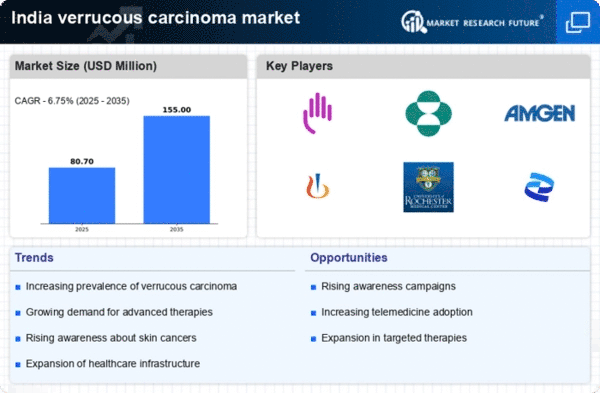Increasing Incidence Rates
The rising incidence rates of verrucous carcinoma in India appear to be a significant driver for the verrucous carcinoma market. Recent studies indicate that the prevalence of this type of cancer is increasing, particularly among individuals with a history of tobacco use. This trend suggests a growing patient population that requires effective treatment options. As awareness of the disease expands, healthcare providers are likely to see more cases diagnosed, which could lead to an increased demand for therapeutic interventions. The market is projected to grow as healthcare systems adapt to manage this rising burden, potentially leading to a market value increase of over 15% in the coming years.
Rising Healthcare Expenditure
The increase in healthcare expenditure in India is another critical driver for the verrucous carcinoma market. As the economy grows, more individuals are likely to seek medical care, including cancer treatment. This trend suggests that patients may have greater access to advanced therapies and healthcare services. The rise in disposable income and health insurance coverage could lead to a higher demand for specialized treatments for verrucous carcinoma. Analysts predict that healthcare spending could rise by 14% annually, which would directly benefit the market by expanding the availability of treatment options and improving patient access.
Enhanced Diagnostic Techniques
Advancements in diagnostic techniques are likely to play a crucial role in the verrucous carcinoma market. Improved imaging technologies and histopathological methods enable earlier and more accurate detection of verrucous carcinoma. This early diagnosis is essential for effective treatment planning and can significantly improve patient outcomes. As healthcare facilities in India adopt these advanced diagnostic tools, the market may experience a surge in demand for related services and products. The integration of these technologies could potentially increase the market's growth rate by approximately 10% annually, reflecting the importance of timely diagnosis in managing this condition.
Growing Research and Development
The emphasis on research and development within the verrucous carcinoma market is becoming increasingly apparent. Pharmaceutical companies and research institutions in India are investing in the development of novel therapies and treatment protocols. This focus on innovation is likely to lead to the introduction of new drugs and treatment options that could improve patient outcomes. As R&D efforts intensify, the market may witness a significant influx of new products, potentially driving market growth by 20% over the next few years. The commitment to advancing treatment options reflects the evolving landscape of cancer care in India.
Government Initiatives and Funding
Government initiatives aimed at cancer control and prevention are expected to positively impact the verrucous carcinoma market. In India, various health programs focus on raising awareness about cancer and improving access to treatment. Increased funding for cancer research and treatment facilities may lead to enhanced resources for managing verrucous carcinoma. These initiatives could result in a more robust healthcare infrastructure, facilitating better patient care and potentially increasing the market size. With government support, the market could see a growth trajectory of around 12% over the next few years, as more patients gain access to necessary treatments.
















